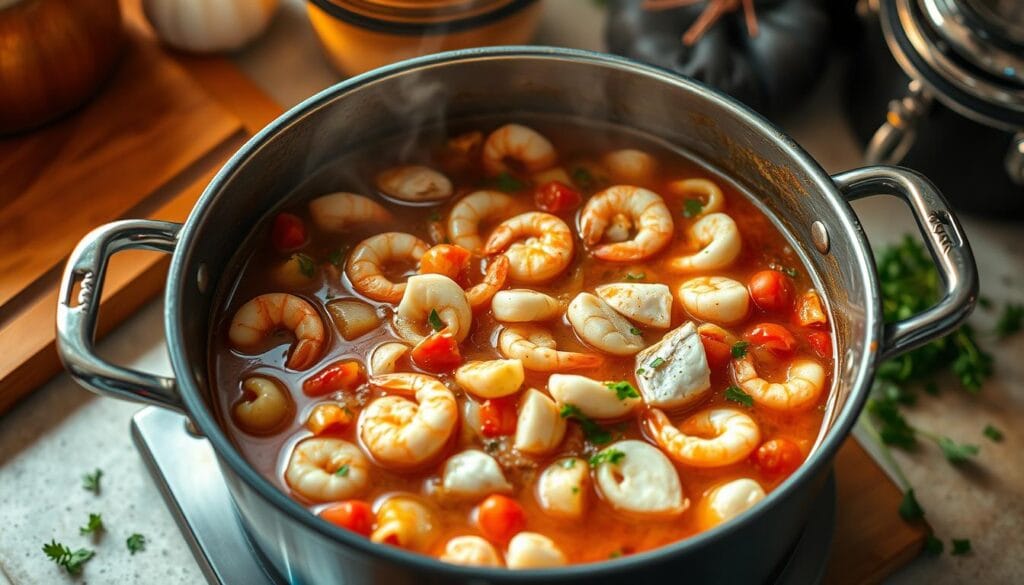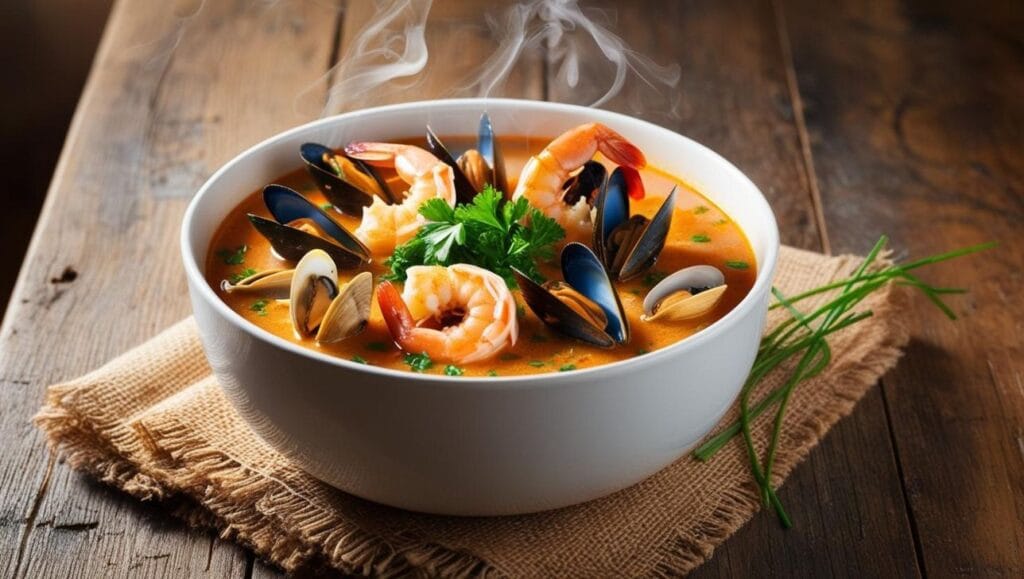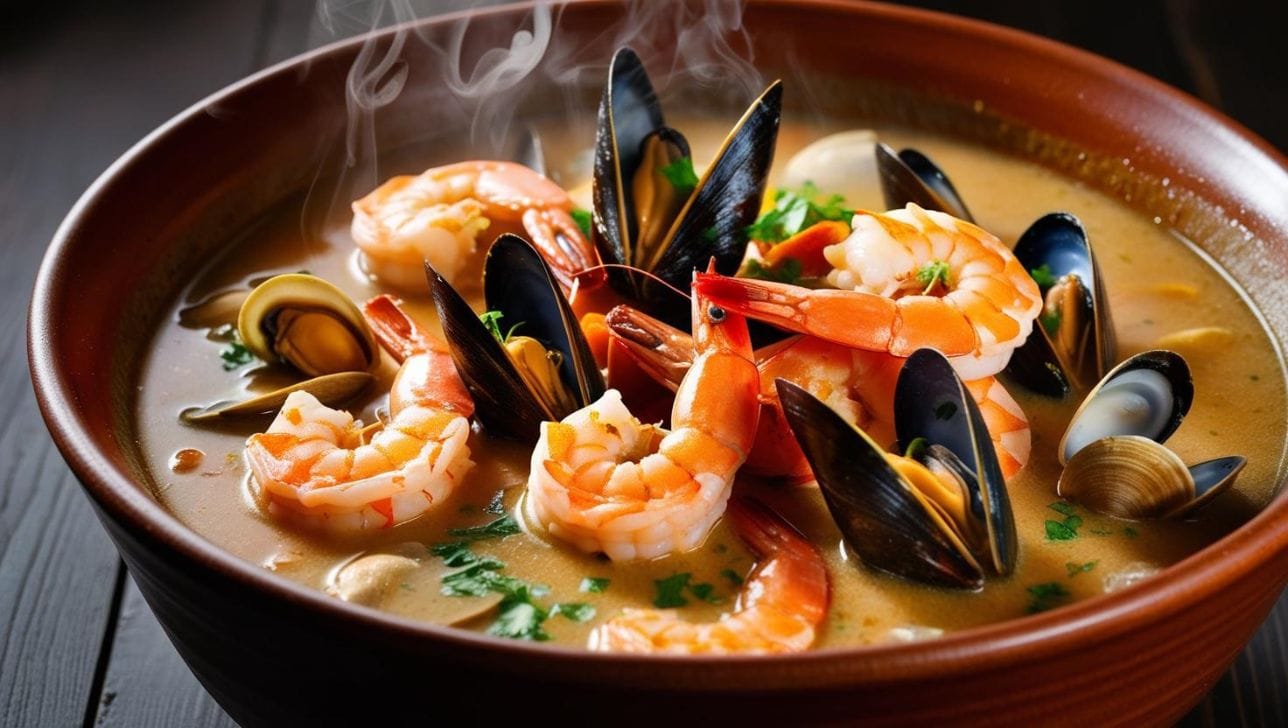Indulge in Best Zuppa di Pesce 2025: A Taste of Italy’s Seafood Soup
Imagine being in Venice, surrounded by the Mediterranean’s fresh tastes. Zuppa di pesce, a traditional Italian seafood soup, takes you to Italy’s canals. This hearty stew combines fresh fish and shellfish in a rich broth. Your first bite will make you crave more.
Introduction to Zuppa di Pesce
Zuppa di pesce is a traditional Venetian fish soup. It showcases the city’s rich maritime culinary history. This dish is perfect for seafood fans or anyone looking to try something new. It’s sure to excite your taste buds.
Table of Contents
Key Takeaways
- Zuppa di pesce is a traditional Italian seafood soup made with fresh fish and shellfish.
- The dish is typically accompanied by toasted bread to soak up the flavorful broth.
- Zuppa di pesce is a hearty and flavorful stew that is perfect for special occasions.
- The soup is a significant representation of Venice’s maritime culinary heritage.
- Zuppa di pesce can be enjoyed in various ways, including as a soupe de fruits de mer or ragoût de poisson à l’italienne.
- The dish is a great way to experience the fresh flavors of the Mediterranean.
- Zuppa di pesce is a popular choice for those looking to try something new and exciting.
The Rich History of Zuppa di Pesce
Exploring Italian cuisine, you’ll find the zuppa di pesce, a traditional seafood soup. It’s a key dish in coastal areas for generations. This soup shows Italy’s deep culinary roots, starting in coastal regions.
Fishing has always been vital in Italy’s coastal towns. Families depend on the sea for their living. The zuppa di pesce’s history is tied to seafood’s importance in Italian food.
Over time, different areas have made their own zuppa di pesce recipes. From the Amalfi Coast to Liguria, each place has its own twist. The dish celebrates Italy’s rich food heritage with its tasty broth and seafood mix.
Some key ingredients in the traditional Italian seafood soup are:
- Fresh seafood like clams, mussels, and shrimp
- Aromatics like onions, garlic, and celery
- White wine and tomatoes for flavor
- Herbs like parsley and basil for freshness
Zuppa di pesce is more than just food; it’s a family and community tradition. In Italy, meals are times to come together. The zuppa di pesce is perfect for any gathering, bringing joy and togetherness.
Essential Ingredients for Authentic Zuppa di Pesce
To make a real Zuppa di Pesce, you must use the freshest ingredients. This includes fish, shrimp, and mussels. These are key for a delicious seafood dish. The way you cook it is also important, balancing flavors and textures.
The dish starts with a rich tomato broth. You’ll need fresh tomatoes, onions, garlic, and herbs like parsley and fennel. The quality of the ingredients greatly affects the dish’s taste and quality.
Choosing the freshest seafood is crucial. This means using fish, shrimp, mussels, and clams. Cooking them right is key to keeping their texture and flavor. A good seafood dish always focuses on freshness and quality.
Other important ingredients include white wine, olive oil, and aromatics like onions and garlic. These add to the dish’s richness and flavor. By sticking to a traditional recipe and using top-notch ingredients, you can make a tasty and authentic Zuppa di Pesce. It will highlight the best of Italian cuisine, with perfect cooking and a delicious seafood flavor.
Selecting the Freshest Seafood
Preparing a tasty Zuppa di Pesce starts with fresh seafood. Visit your local fish market to find the best. Look for fish with shiny scales and firm flesh. For shellfish, pick those with closed shells or that close fast when tapped.
A good guide can help you choose the right seafood. Think about the season to get the freshest catch. Cod, halibut, and snapper are great for Zuppa di Pesce. Mussels, clams, and shrimp add a nice touch too.
Seasonal seafood is key. Winter brings different fish than summer. Ask your fishmonger for the best choices. This way, you’ll make a delicious, authentic Zuppa di Pesce.
When picking seafood, smell, texture, and look matter. Fresh seafood smells mild, feels firm, and looks shiny. Stay away from strong smells, slimy textures, and dull looks. This ensures your Zuppa di Pesce is top-notch.
Traditional Preparation Methods
Preparing Zuppa di Pesce the traditional way is the best. The cuisson de la zuppa di pesce is an art that needs patience and practice. First, clean and prepare the seafood, like fish and shellfish. It’s important to use the freshest ingredients.
The traditional way involves simmering the ingredients in a flavorful broth. This broth might include white wine, garlic, and herbs. The cuisson de la zuppa di pesce is slow and requires attention. It results in a delicious, hearty soup perfect for special occasions.
For making Zuppa di Pesce, use a mix of seafood like clams, mussels, and shrimp. Add onions and garlic to the broth for extra flavor. A squeeze of lemon juice can also balance the taste. With practice and patience, you can make this Italian soup at home.
Regional Variations Across Italy
Exploring Italy, you’ll find many soupe de poisson italienne traditionnelle variations. Each one shows off the local culture and ingredients. From the north to the south, every region has its own seafood soup twist.
In the north, soupe de poisson italienne traditionnelle is heartier. It’s made with fish and shellfish like mussels and shrimp. The broth is rich, flavored with onions, garlic, and fennel.
Heading south, the soup gets lighter. It focuses on fresh seafood and citrus flavors. This makes it a refreshing dish.
Northern Italian Style
In places like Liguria and Tuscany, the soup is deeply traditional. It uses frutti di mare, small, sweet shellfish found locally.
Southern Italian Interpretations
In Sicily and Campania, the soup reflects the area’s rich culture. It’s made with seafood like swordfish and tuna. Flavors include garlic, lemon, and herbs.
Traveling through Italy, you’ll see soupe de poisson italienne traditionnelle’s many faces. Whether in the north or south, it’s a tasty showcase of local culture and ingredients.
The Perfect Broth Base
Making a great broth base is key for a tasty Zuppa di Pesce. Start with a rich fish stock. You can make your own by simmering fish bones and veggies in water, or buy one.
To deepen your broth, try a ragoût de poisson à l’italienne. Sauté onions, garlic, and herbs in olive oil first. Then add the stock. This makes your broth rich and savory, perfect with seafood.
Quality ingredients are crucial for a good broth. Use fresh veggies and aromatics like carrots, celery, and fennel. They add sweetness and anise flavor. You can also try different fish stocks, like a light stock from white fish or a dark stock from salmon. Simmer it for 15-20 minutes to blend the flavors.
Here are some tips for the perfect broth base:
- Use a mix of fish stock and dry white wine for more flavor
- Add onions, garlic, and herbs for extra taste
- Simmer the broth for 15-20 minutes to mix the flavors
- Strain the broth through a fine-mesh sieve to clear it

Follow these tips and use top-notch ingredients for a rich broth. Whether you stick to traditional Italian or try new flavors, aim for a broth that’s both tasty and true to its roots. With practice and patience, you’ll get the hang of it and enjoy a wonderful Zuppa di Pesce.
Wine Pairing and Serving Suggestions
Enjoying Zuppa di Pesce with the right wine can make it even better. Try pairing it with Italian wines like Vernaccia di San Gimignano or Rosso di Montalcino. Vernaccia’s crisp acidity and sea salt minerality pair perfectly with the soup’s flavors.
For a lighter touch, Pinot Grigio is a great choice. It brings out the earthy notes in the soup. If your soup is heartier, a Super Tuscan or Chianti Classico Riserva can add bold fruit and spice.
Serving suggestions can also make your meal special. Try it with crusty bread or a side salad. The goal is to balance flavors and textures with the soup. With the right wine and serving ideas, your meal will be unforgettable.
Some great sides for Zuppa di Pesce include:
- Grilled bread with garlic and herbs
- A side salad with mixed greens and a light vinaigrette
- Roasted vegetables, such as asparagus or Brussels sprouts
These sides add depth and variety, making the meal memorable.
Tips for Making Restaurant-Quality Zuppa di Pesce at Home
To make a delicious Zuppa di Pesce, follow some chef secrets and avoid mistakes. The key is to use the best seafood soup recipe. Choose fresh seafood like cod, calamari, clams, mussels, and shrimp.
Don’t overcook the seafood. It should be just done. Then, let it simmer in the flavorful broth. Adding white wine to the broth makes it even better.
Common Mistakes to Avoid
- Overcooking the seafood
- Not using a variety of seafood
- Not adding enough aromatics to the broth
Professional Chef Secrets
Using a mix of fish and shellfish makes the broth rich and flavorful. Adding saffron or tomato paste deepens the color and taste. These tips help you make a Zuppa di Pesce that impresses everyone.

Follow these tips to make a Zuppa di Pesce like a pro. Use fresh ingredients and try new flavors to make it your own.
| Seafood | Quantity |
|---|---|
| Cod | 1 pound |
| Calamari | 1/2 pound |
| Clams | 1 dozen |
| Mussels | 1 dozen |
| Shrimp | 1/2 pound |
Health Benefits and Nutritional Value
Enjoying a warm bowl of Zuppa di pesce, or soupe de fruits de mer, brings many health benefits. This traditional Italian seafood soup is full of vitamins, minerals, and antioxidants. These come from the seafood, vegetables, and herbs used in making it.
The soup is high in protein thanks to the fish and shellfish. It’s great for those wanting to eat more protein. The omega-3 fatty acids in the fish are good for the heart. The tomatoes and herbs add antioxidants that fight cell damage and inflammation.
Some important nutrients in Zuppa di pesce include:
- Vitamin D from the fish, essential for bone health
- Iron from the shellfish, crucial for healthy red blood cells
- Calcium from the fish and vegetables, necessary for strong bones and teeth
Eating Zuppa di pesce can make your diet more Mediterranean. This style of eating is linked to lower risks of chronic diseases and a longer, healthier life. With its rich flavor and health benefits, Zuppa di pesce is a great choice for a nutritious meal.
Conclusion: Mastering the Art of Italian Seafood Soup
Discovering the art of making zuppa di pesce, Italy’s beloved seafood soup, is a journey. It’s about honoring tradition, using the freshest ingredients, and perfecting your cooking skills. Whether you’re a pro chef or a home cook, mastering this dish is a rewarding experience. It takes you to Italy’s sunny coast.
This journey has shown you the rich history of soupe de poisson italienne traditionnelle. You’ve learned about the different regions and their unique flavors. Now, you can make the flavors of Italy’s seafood in your kitchen.
Remember, the true beauty of authentique zuppa di pesce is in the ingredients and the love you put into it. With patience, detail, and a bit of Italian spirit, you can make your meals special. You’ll take your guests on a trip to the Mediterranean.
FAQ
What is Zuppa di Pesce?
What is the history and cultural significance of Zuppa di Pesce?
What are the essential ingredients for an authentic Zuppa di Pesce?
How do I select the freshest seafood for Zuppa di Pesce?
What are the traditional preparation methods for Zuppa di Pesce?
What are the regional variations of Zuppa di Pesce across Italy?
What is the importance of the broth base in Zuppa di Pesce?
How can I elevate my Zuppa di Pesce experience?
What are the tips and tricks for making restaurant-quality Zuppa di Pesce at home?
What are the health benefits and nutritional value of Zuppa di Pesce?
Source Links
Une réponse à “Indulge in Best Zuppa di Pesce 2025: A Taste of Italy’s Seafood Soup”
[…] Indulge In Best Zuppa Di Pesce 2025: A Taste Of Italy […]


Laisser un commentaire